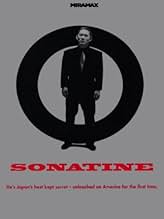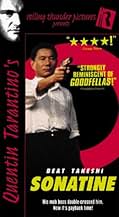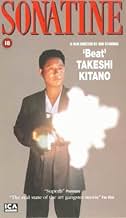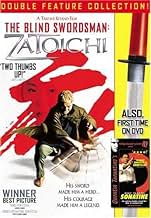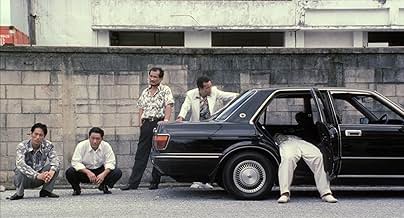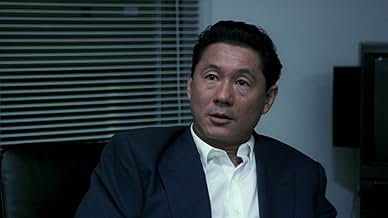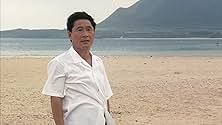Diversi yakuza di Tokyo vengono inviati a Okinawa per aiutare a porre fine a una guerra tra bande. La guerra poi si intensifica e gli sbandati di Tokyo decidono di sdraiarsi sulla spiaggia.Diversi yakuza di Tokyo vengono inviati a Okinawa per aiutare a porre fine a una guerra tra bande. La guerra poi si intensifica e gli sbandati di Tokyo decidono di sdraiarsi sulla spiaggia.Diversi yakuza di Tokyo vengono inviati a Okinawa per aiutare a porre fine a una guerra tra bande. La guerra poi si intensifica e gli sbandati di Tokyo decidono di sdraiarsi sulla spiaggia.
- Regia
- Sceneggiatura
- Star
- Premi
- 4 vittorie e 1 candidatura in totale
Recensioni in evidenza
It begins with very unsentimentalized and nonglorified violence. People hit and kill each other and it isn't much different than toast popping out of the toaster. It is fast, moderately bloody, and there. Kitano doesn't seem to be interested in thrilling us with either the danger, grotesqueness, or thrill of violence--another, not clearly defined agenda is at work here.
At perhaps a third of the way into the film, it makes a sudden transition from this gangster life to a period of forced inactivity. I suspect this section, which is delightfully playful, is at the heart of this film.
I love how the only emotions Murakawa expresses are humor and nihilist apathy. The "sumo scene" is so delightfully out-of-place, while the ending simply leaves your mouth open. The warmth the characters show just makes it more hurtful when they meet such pathetic, low-key ends. I'm not an expert on Japanese society, but I see this film as a comment on the emptiness of a fear-filled culture of reservation, where it is more important to show restraint and respect than it is to continue living.
I'll still enjoy good ol' HK pistol operas, but I'll never see them quite the same again.
Lo sapevi?
- QuizThe title Sonatine comes from the musical term sonatina. Kitano said that when learning the piano, when the learner gets to sonatinas they have to decide where they want to go, whether it is to classical, jazz or popular music; marking the point of crucial decision making. This refers to the character Murakawa in the film.
- Citazioni
Miyuki: You're tough. I love tough guys.
Aniki Murakawa: I wouldn't carry a gun if I were tough.
Miyuki: You can shoot without a second thought.
Aniki Murakawa: I shoot fast because I get scared fast.
Miyuki: But you're not afraid of dying, are you?
Aniki Murakawa: When you're scared all the time, you reach a point when you wish you were dead.
- Curiosità sui creditiAt the end of the closing credits, various shots of the beach that were taken a year or so later, are included.
- ConnessioniFeatured in Century of Cinema: Nihon eiga no hyaku nen (1995)
I più visti
- How long is Sonatine?Powered by Alexa
Dettagli
Botteghino
- Lordo Stati Uniti e Canada
- 58.834 USD
- Fine settimana di apertura Stati Uniti e Canada
- 17.527 USD
- 12 apr 1998
- Lordo in tutto il mondo
- 58.834 USD
Contribuisci a questa pagina



